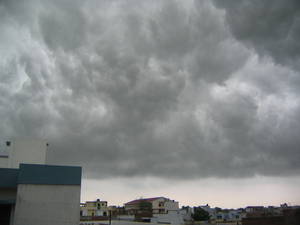Is climate change altering weather?
Interview with
Is the extreme weather of recent years a consequence of climate change? Climate scientist, IPCC lead author and 2007 Nobel Peace Prize-winner Don Wuebbles explains  to Chris Smith why he thinks this is a taste of what is to come...
to Chris Smith why he thinks this is a taste of what is to come...
Don - The climate is changing worldwide, climate being the long term variations in weather of course, but it's much more than that. The fact that that change's occurring because of human activity's becoming clearer and clearer over time. We now are beginning to even talk about that dangerous climate change isn't just going to happen in the future. It's happening now.
Chris - Just summarise for us what the big changes are. What are we seeing and where?
Don - So, we're seeing overall long term changes in temperature. We're seeing relatively small changes overall in precipitation. Some places getting dryer, some places getting wetter, but it's much more than that. It's this concern about severe weather. We're seeing much more concern about heat waves, less cold waves overall. We're also seeing more precipitation coming as much larger events than in the past.
Chris - What do we think the drivers of this are?
Don - The analysis are very clear, that you cannot explain these long term changes we're seeing as being due to natural causes. The only thing that really is able to explain the observed changes is the fact that because of our burning of fossil fuels, other human induced changes in our planet that we're increasing the amount of carbon dioxide, the amount of methane, the amount of some other key gases. And those gases so happen are very important to life on Earth in the first place because without those gases, we wouldn't have life here as we know it. This would be a frozen planet. So, having those greenhouse gases is really important. The problem is, because of human activities, we're increasing the amount of those greenhouse gases substantially. The amount of carbon dioxide for example has increased from about 280 parts per million to over 400 parts per million and it continuously increase and that's driving changes. We haven't seen levels of carbon dioxide in the Earth's atmosphere of that size for over 2 million years.
Chris - Do we know what the weather was like 2 million years ago when it was that high?
Don - We don't totally know what the weather was, but we do know that it was a much, much warmer climate on this planet at that time than it is now. Places like Antarctica and Greenland were without ice. Much higher sea levels, we may not be worried about what's going to happen in the next several thousand years, but we certainly should be concerned about what's going to happen over the century when these changes in climate are going to be affecting our children, our grandchildren.
Chris - Obviously, 2 million years ago, there were early pre-humans around, but they certainly weren't emitting CO2 the way that we modern humans are now. So, where did the CO2 that was in the atmosphere and at high level then come from?
Don - Those high levels of carbon dioxide actually came from outgassing from very large volcanoes. Current volcanic eruptions have very small effects in the amount of CO2 in the atmosphere, much, much less than human amount and really, do not contribute to the increase that we're seeing now.
Chris - What about the severe weather manifestations that we're now seeing potentially linked to this? Why do we get more severe weather when the CO2 in the atmosphere rises?
Don - Some aspects of it, we understand pretty well. We know for example as the temperature is increasing, that a warmer atmosphere can hold more water vapour. And so, that additional water vapour is then available for precipitation. In addition, there's just more overall energy in the entire Earth's system because of this increases in these gases. It's just overall trapping more energy into the Earth. So, we expect things like more precipitation coming as larger events. But also, analyses are tending to show that some very large events like hurricanes are likely to be more intense in the future. Right now, we can't say much about the number, but the intensity is likely to be larger.
Chris - What about time scale? When should I consider moving further from the coast?
Don - Well, the big concern of the coast particularly are going to be the increase in sea level and storm surge. The projections over this century are something like 20 to 80 centimetres by IBCC. I think in the National Climate Assessment, we were a little bit more generous and said it could be as much as a meter. None of that is going to happen soon, but we are seeing an acceleration in the rate of sea level rise. I think you clearly have several decades available for you to still live near the coast, but after the next few decades or so, you may get concerned.
- Previous Draining the Fens
- Next Gene therapy makes cells HIV resistant









Comments
Add a comment